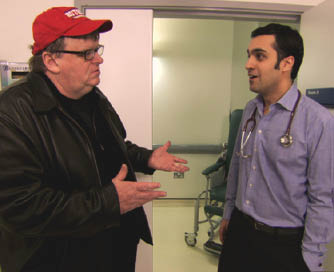Feelin' Alright?: Sicko
by M. Faust

Michael Moore has been interested in the American healthcare system as a topic for a film since the late 1990s, when a segment he shot for his TV show The Awful Truth provided the seed for Sicko. He was sidetracked for a few years by other issues: the 2000 election, Columbine, the Iraq war.
Still, none of that should make you think that there’s anything coincidental about the arrival of Moore’s new film in theaters at this particular moment in time. With what seems like two or three hundred politicians already campaigning to replace George W. Bush in the White House next year, chattering though a string of cattle-call “debates” that encourage political posturing at the expense of substance, Sicko is a boot aimed directly in the ass of the 2008 elections, demanding that health care be given the time it deserves as a top campaign issue.
Let’s be clear about something: Moore really isn’t a documentarian, out to reveal the world to us, even if we may gain some new information from his films. He’s a propagandist, reaching for an emotional rather than a rational reaction from his viewers. He wants to make you mad as hell and unwilling to take it anymore. And he’s got his work cut out for him.
He doesn’t need to convince us that American healthcare is a system that works only for the insurers and hospitals that make a profit from our injuries and illnesses. Do you know anyone who believes it does? If you don’t live in fear of your loved ones or yourself losing everything you have due to some catastrophic health issue, you’re either a Zen master or seriously abusing the ganja. Yet we seem to accept that it’s an insoluble problem, despite the best efforts of our representatives in Washington.
Sicko doesn’t dwell at great length on horror stories of people who have been failed by the system. To the extent that it does, Moore concentrates on the abuses of insurers whose function is not to help people get the medical care they need but rather to keep their costs down. As heartwrenching as the examples of people who have lost loved ones due to this systemic indifference are, even more chilling are the confessions of insurance industry workers who describe their company’s policies designed to maximize profits at any cost.
But two hours of that, even with the leavening of Moore’s ironic humor, would be a movie nobody would want to see. Instead, Moore concentrates on demonstrating that it doesn’t have to be this way. Armed with the standard criticisms the American Medical Association and other lobbying groups raise against the “socialized medicine” of countries that offer universal health care, Moore examines those programs. And what does he find?
He does not find Canadians standing in long lines. He finds middle-class Frenchmen with more than enough left over from their tax bills to live the good life. He finds Brits who are able to choose their own physicians, who in turn enjoy a high standard of living. He finds Cubans who, whatever their other problems, live longer and healthier lives than Americans. (For that matter, so do the Canadians, the Brits and, despite their love of cigarettes, wine and butter, the French.)
I’m sure the industry representatives will be out in force in the next few weeks pointing fingers at Moore’s elisions, evasions and shortcuts. The NPR show On the Media recently did a report detailing how NPR interviews—like those of other news outlets—are edited and buffed to give them an appearance of spontaneity and perfect flow that didn’t really exist. Why? Not to lie to us, but to take out the stuff that just gets in the way of the point. And with Moore’s movie, the point is: It doesn’t have to be like this.
When I said that Moore wants to make us mad as hell, that was only half true. He also wants to appeal to the best part of our nature as Americans. He realizes that the healthcare mess points out a larger flaw in our country, the degree to which we have let go what we claim to be proudest of, our democracy. As in all of his films, Moore gives examples of Americans pulling together to help their neighbors in time of crisis. So why does that impulse get diluted in the big picture, true on a community level but not a national one? Perhaps because we feel a direct emotional connection to the people who are physically closest to us, a connection that fades with distance. Sicko is a propaganda piece that seeks to establish that connection. If that doesn’t work for you, consider it an appeal to our selfishness, asking why we don’t demand of our government the things we established it to do—to provide not just for liberty and the pursuit of happiness, but for life itself.
|
Issue Navigation> Issue Index > v6n26: Recycle Your Cash (6/28/07) > Film Reviews > Feelin' Alright?: Sicko This Week's Issue • Artvoice Daily • Artvoice TV • Events Calendar • Classifieds |









 Current Issue
Current Issue